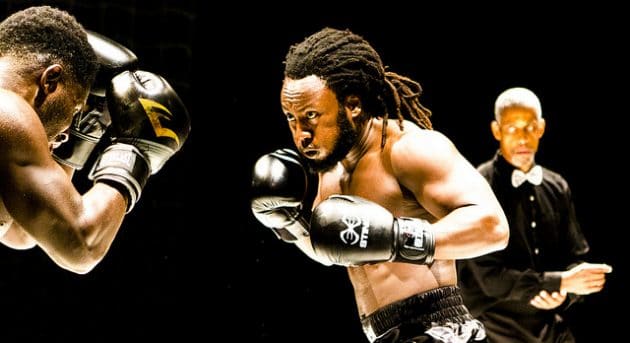Prize Fighter – Belvoir, Sydney Festival
Every minute of Prize Fighter, the acclaimed playwrighting debut by Future D. Fidel, is essential. At only 65 minutes in length the play, now at Belvoir after a strong season at Brisbane Festival, is a fight for life.
Isa (Pacharo Mzembe), a refugee newly settled in Australia, is a boxer training for a national title and Bill Haylock’s set keeps us perpetually in the boxing ring, no matter where we are – training, fighting, or back in the Congo, where the horrors of Isa’s past are never too far from his mind. With money and a title finally under his belt, Isa will be secure in Australia; then he can really focus on finding his brother, from whom he was separated as a child.

The cast, led by Mzembe’s seemingly-stoic, compelling Isa, never stop moving. They’re working out in the gym Isa attends, they’re his coach (Margi Brown-Ash), his sister and girlfriend (Zindzi Okenyo), his father and opponent (Kenneth Ransom), his friend and fellow child soldier (Thuso Lekwape) his brother and captor (Gideon Mzembe). It’s a clever device, because Isa’s trauma, like the trauma of so many people, is never too far from his thoughts, actions, or interactions with others.
Tightly plotted and smartly structured, the play’s frequent flashback device never begins to feel tired. While early on you learn the play’s narrative language and begin to wait for the next flashback, there’s still room to surprise and upend audience expectation – not just through the story, which is gripping and demands your entire heart – but through the work of director Todd Macdonald, who ensures Isa’s story (based, part, on Fidel’s own) is clear, engaging, and well-served.

His scene transitions keep us wanting more and so do and the adrenalin-raising score, by composer and sound designer Felix Cross and remixed by Busty Beatz, and the fights themselves, choreographed with a naturalistic hand by movement and fight director Nigel Poulton. Fidel, MacDonald, and the creative technicians propel us through the work, told with beautiful performances, and it may well leave you weeping. It all leads to the saddest, most wonderful final moment: a portrait of extraordinary humanity that mustn’t be spoiled.
This is a play is about trauma: the fault-lines of terror, grief, loss and rage that course through a life and begin to shape it. Young Isa is never really steering his own path; to survive he must work alongside the militia that killed his family, he must go to a refugee camp in Kenya, and he must apply to live in Australia, a place he knows nothing about.
Prize Fighter is quick to remind us, too, that arriving in Australia as a refugee is another nightmare in itself. This supposed paradise is suspicious of him, sharp with him, and there’s not much empathy to be found until Isa meets a guy at the gym who also speaks Swahili.
In a country that attracts global dismay and disapproval for its human rights abuses when ‘processing’ refugees, Prize Fighter feels urgent and necessary: a shot of empathy for everyone who’s ever blamed refugees for their own sub-human treatment by Australian authorities.




